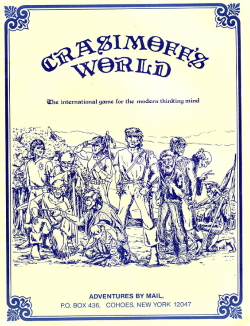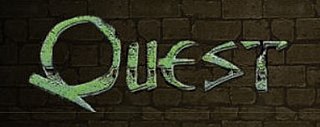Related Research Articles

A play-by-mail game is a game played through postal mail, email or other digital media. Correspondence chess and Go were among the first PBM games. Diplomacy has been played by mail since 1963, introducing a multi-player aspect to PBM games. Flying Buffalo Inc. pioneered the first commercially available PBM game in 1970. A small number of PBM companies followed in the 1970s, with an explosion of hundreds of startup PBM companies in the 1980s at the peak of PBM gaming popularity, many of them small hobby companies—more than 90 percent of which eventually folded. A number of independent PBM magazines also started in the 1980s, including The Nuts & Bolts of PBM, Gaming Universal, Paper Mayhem and Flagship. These magazines eventually went out of print, replaced in the 21st century by the online PBM journal Suspense and Decision.

Flying Buffalo Inc. (FBI) is a game company with a line of role playing games, card games, and other gaming materials. The company's founder, Rick Loomis, began game publishing with Nuclear Destruction, a play-by-mail game which started the professional PBM industry in the United States. Loomis added games and players while introducing computer moderation and soon incorporated into the company Flying Buffalo Inc. The company published games in other genres, including card games such as Nuclear War and a role playing game called Tunnels & Trolls, a game similar to Dungeons & Dragons. Flying Buffalo acquired its 10,000th customer account number in 1980 and reached its largest size of 21 employees in 1983.
Starweb is a closed-end, space-based, play-by-mail (PBM) game. First published by Flying Buffalo Inc. in 1976, it was the company's second PBM game after Nuclear Destruction, the game that started the PBM industry in 1970. Players today can choose a postal mail or email format. Fifteen players per game assume one of six available roles and explore and conquer planets within a universe comprising 225 worlds. The object of the game is to attain a predetermined number of points which are generated by various actions during gameplay. Multiple game variants are available. Starweb is still available for play as of 2021 through the company Rick Loomis PBM Games.

Legends is a turn-based, role-playing game with a medieval setting. It is currently published in English by Harlequin Games. Jim Landes—owner of Midnight Games, the game's first publisher—began developing the game in 1984, eventually publishing it in December 1989 as a play-by-mail (PBM) game after over a year of playtesting. The initial game comprised a module and game system built on the publisher's existing game, Epic, and was run briefly as Swords of Pelarn before publication as Legends. The first of multiple game modules was Crown of Avalon, which allowed up to 200 players per game. Demand by 1991 was "incredible" according to Bruce R. Daniel in White Wolf. Games could be lengthy, initially between three and ten years of play, settling into an average of three years by 2002.

Heroic Fantasy is a computer-moderated, dungeon crawl play-by-mail game. It has been active since 1982 when it was published by Flying Buffalo. The initial edition involved nine dungeon levels. Flying Buffalo published subsequent editions due to challenging gameplay initially, eventually limiting the game to four dungeon levels with a fifth outdoors level where players can assemble an army and capture one or more castles. The game is open-ended; gameplay continues until players decide to stop.

Hyborian War is a play-by-mail game published by Reality Simulations, Inc. It takes place during the Hyborian Age in the world of Conan the Barbarian created by Robert E. Howard. The game has been continuously available for worldwide play since its inception in 1985 and has changed little in its overall format. It uses a computer program to adjudicate player orders. Although it relies on postal mail or email and has turnaround times which are relatively long for the digital age of video games, Hyborian War has remained active into the 21st century.
Illuminati is a computer-moderated play-by-mail game published by Flying Buffalo Inc. It is based on the Illuminati card game by Steve Jackson Games. It was originally owned by Adventure Systems but transitioned to Flying Buffalo Inc in 1986. The game's central focus is on conspiracy and intrigue and involved 24 players playing either by email or by mail in turns processed simultaneously by computer. Illuminati has won the Origins Award for Best Play-By-Mail Game seven times, once in 1985 and six times in the 1990s, and was inducted into the Origins Hall of Fame in 1997.
Paper Mayhem is an out-of-print play-by-mail (PBM) game magazine that was published in Ottawa, Illinois. The staff published the initial issue in July 1983 and the magazine ran until mid-1998. Its format was 40 pages published six times per year. The magazine was the most well-known of the play-by-mail periodicals of the period, providing articles and reviews of play-by-mail games, as well as reader-informed ratings of play-by-mail companies, game masters (GMs) and games, both intermittently and on an annual basis. The magazine, along with its long-time editor-in-chief, David Webber, was influential in the play-by-mail community, even echoing into 21st century play-by-mail activities. The publication ceased suddenly in mid-1998 following the unexpected death of Webber.
Kings & Things was a computer moderated fantasy play-by-mail game published by Andon Games that was active in the 1980s and early 1990s. In the game, up to twenty players took the role of leader of a kingdom and recruited "things" or creatures to assist them in becoming the next emperor. Combat, diplomacy, and magic played significant roles in this fantasy role-playing game. Reception was generally positive, although there were comments about cumbersome turn results during the late 1980s. The game enjoyed peak reviews and ratings in the late 1980s and early 1990s, winning the Origins Award for best play-by-mail game in 1988.
CTF 2187 is a closed-end, computer-moderated, play-by-mail (PBM) game that was published by Advanced Gaming Enterprises in the 1980s. It involved teams of robots, of varying size and capabilities, battling on a hex-grid arena with the purpose of defeating the opposing team or their command post. Players assumed the role of a battle robot pilot. The game was tactically-focused, with combat action beginning on the first turn. Games lasted 5–10 turns, or about six months. Players began at the rank of cadet but could spend experience points earned from a completed game to increase in rank for future games, up to the rank of General.
Beyond the Stellar Empire is a play-by-email (PBM) game. Originally published by Adventures By Mail, BSE was an open-ended "space opera" with a single available game that began in playtesting in 1981. According to Stephen Marte, during the mid-1980s, like "Tribes of Crane and Midgard, BSE [was] the stomping ground of many of PBM's best power gamers". The game had two variants, one monitored by Game Masters who imposed artificial constraints, and another without constraints. Gameplay took place on a vast space stage where mega-corporations formed the dominant organizing framework, alongside various other groups that players could join to pursue tasks to advance, collaborate with other players, and progress to more senior positions such as space colony governors. Beyond the Stellar Empire placed #5 and #11 for Best PBM Game of the Year in 1987 and 1988, respectively, in Paper Mayhem, a magazine for play-by-mail games. In subsequent years, the game did not score well in Paper Mayhem reader ratings for playability, use, and product understanding. Beyond the Stellar Empire: The New System won the Origins Award for Best New Play-By-Mail Game of 1989.
It's a Crime is a play-by-mail (PBM) game initially published by Adventures By Mail in September 1985. On publication, it was an introductory PBM game that took place in New York City in the 1990s where players attempted to raise a gang leader to the position of Godfather. During its initial decade, gameplay was technically simple at the outset, but added additional possible turn orders if players progressed to higher levels such as "mob boss". The coordination and diplomacy among players added additional complexity to the game. The game won the Origins Award in 1986 for the Best New Play-By-Mail Game of 1986 and a second Origins Award for Best Play-by-Mail Game of 1989.

Crasimoff's World is a play-by-mail (PBM) game that was first developed by Kevin Cropper in 1980. It is regarded as the first fantasy role-playing PBM game.
Lords of the Earth (LOTE) is a play-by-email game, first published by Thomas Harlan in 1983 during a growing era of PBM games. Initially played by postal mail, the game featured mixed moderation—computer moderated with some human assistance. By 2002, the publisher processed turns by email (PBeM). Lords of the Earth comprises multiple campaigns, each one a separate game. Campaign 1 is the oldest, set in the mid-1800s in the "Age of Air and Steam". Other campaigns begin from 2000 BCE to 1400 CE. Settings were global in scale, with one campaign featuring an outer space setting.
Adventures by Mail is a company that published play-by-mail (PBM) games. The company was founded in 1981. It published various PBM games including Beyond the Stellar Empire, It's a Crime, and Monster Island.

Victory! The Battle for Europe is a closed-end, military strategy, play-by-mail (PBM) wargame. The game was first published by Rolling Thunder Games, Inc. in 1991 after a period of initial growth in the PBM industry. The game centers on Europe while including parts of North Africa, the Middle East, the United States, and Canada. Forty players start each game with equal resources among countries, although geography causes differences between starting positions. Games last for about three years each. The game received positive reviews and rankings in the PBM magazine Paper Mayhem in the 1990s, including tying for second place in its Best PBM Game of 1995 list.

Quest is an open-end, fantasy, play-by-mail (PBM) role-playing game. Initially released in the United Kingdom in 1991, by Adventures by Mail, it later became available for play in the United States, Australia, and other countries in Europe. The game has a First and Second Age, initially comprising about twenty worlds of up to 1,000 parties controlled by players. After the year 2000, the worlds consolidated into four. The current publisher is KJC Games.
Epic is a computer-moderated, fantasy play-by-mail (PBM) game.
Crystal Island is a closed-end, mixed-moderated, heroic fantasy play-by-mail game. It was published by Saul Betesh. Similar in gameplay to Advanced Dungeons & Dragons and Tunnels & Trolls this solo adventure was under way by 1990 as one of three starter games within Betesh's "Draconian System" which featured the expansive multi-player fantasy game DragonsKeep. Players generated a character for role-play with various attributes and skills, advancing by amassing experience points to increase levels. Players accomplished their goal by acquiring three keys and traveling to the Crystal Tower to complete a quest. The game received generally positive reviews in gaming magazines in the early 1990s.
References
- 1 2 3 4 5 Dubois 1997. p. 4.
- ↑ KJC Games 2020.
- 1 2 3 4 5 6 7 8 Helzer 1993. p. 12.
- ↑ Adventures By Mail, Inc. 1990. p. 9.
- ↑ Helzer 1993. p. 13.
- 1 2 Smith 1997. p. 7.
- ↑ Breault 1992. p. 16; Holmes 1991. p. 9.
- 1 2 3 4 Guerrero 1992. pp. 47–48.
- 1 2 DuBois 1997. p. 5.
- ↑ DuBois 1997. p. 6.
- ↑ Origins 1990.
- ↑ Paper Mayhem 1990. p. 3.
- ↑ Paper Mayhem 1990. p. 64.
- ↑ Breault 1992. p. 17.
- ↑ Paper Mayhem 1992. pp. 52–53.
- ↑ Paper Mayhem 1995. pp. 44–45.
- ↑ Paper Mayhem 1997. p. 30.